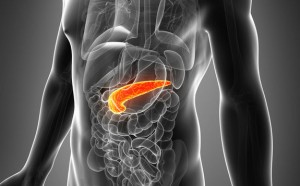Pancreatic cancer is one of the most deadly silent killers. It is an aggressive disease with poor prognosis and limited treatment options, and is highly resistant to both chemotherapy and radiotherapy. Most patients develop symptoms after the cancer has spread to other organs, and the chance of survival drastically reduced. According to the Canadian Cancer Society, 4,700 Canadians will be diagnosed with pancreatic cancer this year – and 4,300 will die from it. More effective treatment methods are desperately needed to increase shockingly low survival rates. New clinical research from scientists at the Universities of Manchester and Michigan may provide a viable solution; a way to improve the effectiveness of chemotherapy and radiation in patients with pancreatic cancer.
New understanding of what fuels cancer cells
Researchers in Manchester discovered that pancreatic cancer cells may have their own specialised energy supply that maintains calcium levels and keeps the cancer alive. The diseased cells can only survive if a low level of calcium is maintained – and this is achieved by way of special calcium “pumps” located on the plasma membrane. The pumps can’t work without fuel known as ATP – the key energy currency for many cellular processes. In order to understand the relationship between cancer growth and calcium levels, scientists tried blocking the energy sources of sample cancerous cells. Eventually, they discovered how to inhibit the calcium pump itself, which caused the cancer cell to die.
A new use for gemcitabine
The research team at Michigan University’s Comprehensive Cancer Centre has identified a new way of effectively combining gemcitabine with targeted radiation therapy for patients with pancreatic cancer. Professionals in the field and students in pharmaceutical courses understand that a medication is only worthwhile if it does more good than harm. By targeting both the pancreatic tumour and cancer cells throughout the body, researchers have discovered how to combine gemcitabine with radiation while avoiding historically disastrous side effects. The new approach effectively targets the primary cancer while still delivering systemic therapy for potential spread, something no other study has attempted.
What comes next?
Now that the Manchester scientists have learned how to suppress the energy supply to the calcium pump, they have successfully pinpointed a major weakness in those aggressive pancreatic cancer cells. But finding ways to effectively apply the knowledge will take time. The research is still in its initial phases, yet to begin the process of drug development and pharmaceutical quality assurance protocols. However, the new radiation and gemcitabine combo will soon begin trials in medical centres across the country, offering hope to thousands of pancreatic cancer patient who would otherwise face a very bleak prognosis for survival.
Would you be willing to participate in an experimental trial if diagnosed with a particularly aggressive illness?




